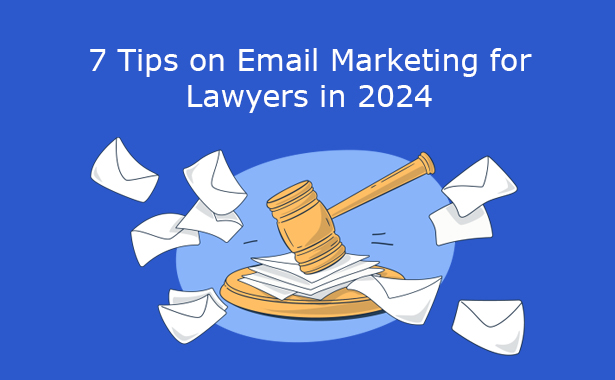Contents
8 Lead Generating Tweaks for Your Legal Marketing Strategy
The legal industry is highly competitive, and a well-rounded marketing strategy is essential to ensure your law firm thrives. Effective lead generation for law firms requires a combination of marketing strategies. Importantly, regular updates and fine-tuning are not signs of failure, but rather the key to adapting and thriving in the dynamic legal market. Developing a comprehensive legal marketing strategy is essential for firms looking to attract new clients and stand out in a competitive market. Here are several creative and actionable ways to tweak your legal marketing approach and how to generate more leads for your firm.
1. Optimize Your Website for Conversion
Your law firm’s website is often the first point of contact for potential clients. Enhancing its performance with a conversion-focused design can turn more visitors into leads. One key strategy is to incorporate clear Call-to-Actions (CTAs). Place prominent and persuasive CTAs, such as “Schedule a Free Consultation” or “Get Legal Help Now,” on every page to encourage visitors to take immediate action. Equally important is the user-friendly navigation. Ensure your site’s navigation is straightforward and intuitive, helping visitors quickly find the needed services and boosting their confidence in your firm.
Additionally, mobile optimization is crucial. With a significant portion of users browsing on mobile devices, having a mobile-optimized website is essential for providing a better user experience and improving search rankings. Equally critical is the need for fast loading times. A slow website can drive visitors away, so use tools to check and enhance your site’s loading speed for optimal performance, ensuring potential clients stay and explore your services.
2. Create Targeted, Value-Driven Content
Knowing how to get more leads involves leveraging digital marketing tactics like content creation. Content marketing is an excellent tool for lead generation when executed correctly. Focusing on quality, targeted content can attract the right audience and generate meaningful engagement. Utilizing content marketing and informative blog posts is a proven method for lead generation for law firms, helping to build trust and attract relevant clients.
One effective legal marketing strategy is to develop legal guides and resources. Offering downloadable guides on topics your potential clients frequently inquire about is a great way to provide value. In exchange for these guides, you can collect email addresses for future follow-up, enhancing your lead generation efforts.

Another approach is to create client-centered blog posts. Write blogs that address common legal concerns and offer actionable solutions. Tailoring your content for specific niches, such as family law, personal injury, or corporate law, will help attract the right audience and build credibility in those areas.
Video content is also a powerful tool. Creating informative videos explaining legal processes, answering frequently asked questions, or sharing case studies can significantly increase engagement. Videos are a highly effective medium for improving conversion rates and making complex legal topics accessible to potential clients.
3. Offering Free Legal Consultations or Downloadable Guides on Your Website
Offering free legal consultations or downloadable guides on your website can significantly boost lead generation for law firms by providing value to potential clients upfront. These offers act as an incentive for visitors to engage with your firm, giving them a risk-free way to learn more about their legal situation and how your services can help. A free consultation allows potential clients to experience your expertise firsthand, making them more likely to convert into paying clients.
Similarly, offering downloadable guides on common legal issues—such as “How to File a Personal Injury Claim” or “Understanding Divorce Proceedings”—helps position your firm as a knowledgeable and trusted resource. In exchange for this valuable information, you can collect contact details, which then allows for follow-up and nurturing through email campaigns or phone calls.
These strategies not only build trust but also create an ongoing relationship with potential clients, increasing the likelihood that they will turn to your firm when they need legal assistance. Plus, by capturing leads early in their decision-making process, you are ensuring that your firm stays top of mind as they move forward in their legal journey.
4. Use Social Proof to Build Trust
In the legal world, trust is everything. The incorporation of social proof into your legal marketing strategy is not just a choice, but a necessity that can significantly enhance your firm’s reputation and credibility. Social media engagement and targeted email campaigns are not just tools, but essential components for successful lead generation for lawyers, driving both traffic and inquiries.
One powerful way to build trust is by showcasing client testimonials. Regularly feature written and video testimonials from satisfied clients on your website and social media channels. These endorsements can strongly influence prospective clients’ decisions by demonstrating your firm’s success and reliability.
Case studies are not just another tool, but a powerful way to showcase your expertise. Detailed case studies highlighting how you successfully resolved past clients’ legal issues allow potential clients to see firsthand how you have handled similar situations. This can instill a compelling confidence in why they should choose your firm.
Finally, professional endorsements are not just a bonus, but a crucial element in boosting credibility. Highlight any partnerships or endorsements from respected professionals within your industry, as these can provide a strong reassurance and further strengthen your reputation and build trust with potential clients.
5. Leveraging Social Listening to Answer Legal Questions
Social listening is a powerful strategy involving monitoring online conversations to identify what people say about specific topics, industries, or businesses. Using social listening tools, law firms can tap into the concerns and questions potential clients raise on social media, forums, and other platforms. Once these insights are identified, they can be used to create highly relevant and valuable content that addresses specific legal concerns, positioning the firm as a trusted resource.
To conduct social listening and use it to answer legal questions in your content, you can start by monitoring relevant platforms. Use tools like Hootsuite, Brandwatch, or Sprout Social to track platforms where people commonly ask legal questions, such as social media (Twitter, Facebook, LinkedIn), legal forums (RunSensible Pro), and Q&A websites (Quora, Justia). Focus on keywords related to your practice areas, such as “personal injury claims,” “business contracts,” or “family law issues,” to capture the most relevant conversations.
Once you gather data, identify common legal concerns by looking for patterns in the questions people are asking. For example, you might see a trend where people seek advice about filing personal injury claims, resolving divorce disputes, understanding business contracts, or handling real estate transactions. Recognizing these frequently asked questions can tailor your content to address the most pressing concerns.
After collecting insights, create targeted content that answers the identified legal questions in a clear and actionable way. For example, write detailed blog posts on topics like “What to Do After a Car Accident to Strengthen Your Injury Claim” or “Steps to Drafting a Legally Binding Business Contract.” You can also create video content to explain complex legal processes, such as “How to Navigate the Divorce Process in [Your Location],” or host live Q&A sessions on topics like “Understanding Employment Law Rights” to engage directly with potential clients.
Engage with potential clients by using social listening to respond to individuals asking legal questions online. While you cannot provide specific legal advice on social media, you can offer general guidance and invite them to schedule a consultation with your firm. This direct interaction builds trust and positions your firm as approachable and knowledgeable.
Additionally, provide legal resources by offering downloadable guides or FAQs on your website based on your identified questions. For instance, you could create a guide on “Filing a Personal Injury Lawsuit in [State]” for individuals discussing accidents or a checklist on “What to Include in a Prenuptial Agreement” for those exploring family law matters.
Optimize your content for SEO to ensure it is discoverable. Use the same phrases and questions you found during social listening as keywords. For example, if people ask, “What are my rights in a personal injury case?” make sure this question appears in your blog titles, meta descriptions, and headers to improve search engine visibility.
Creating evergreen content is also essential. Address common legal questions that remain relevant over time, such as “How do I file for bankruptcy?” or “What are my rights as a tenant?” This type of content will continue to attract potential clients through search engines and social shares over the long term.
Finally, incorporate social proof into your content by including testimonials or case studies that relate to the legal concerns you are addressing. This helps establish credibility and demonstrates your firm’s success in handling similar cases.
For example, if social listening reveals that many small business owners are confused about how to dissolve their businesses, you could write a blog post titled “How to Legally Dissolve Your Business: A Step-by-Step Guide.” In this post, address key questions you have observed, such as “Do I need a lawyer to dissolve my business?” and “What happens to contracts when a business closes?”
By combining social listening with your content creation strategy, your law firm can provide timely and relevant answers to potential clients’ legal questions, enhancing your reputation and improving how to generate more leads. This method ensures your content resonates with your target audience and positions your firm as a thought leader in your practice areas.
6. Partner with Local Businesses and Professionals
Building relationships with local businesses and professionals can be a valuable source of referrals for your law firm, helping to expand your client base through trusted connections.
One effective strategy is cross-promotion. Partner with non-competing professionals, such as accountants or real estate agents, and establish a referral system where you can send clients to each other. This creates a mutually beneficial network that strengthens your local business relationships.
Sponsoring local events is another excellent way to increase your firm’s visibility. Attend or sponsor community events to build connections and showcase your firm’s presence. Participating in charitable events also enhances your firm’s reputation, presenting you as an engaged and supportive community member.
Implementing referral programs can further boost your lead generation. Offer incentives to clients or other professionals who refer new business to your firm. Referral programs encourage word-of-mouth marketing, one of the most influential and cost-effective ways to attract new clients.
7. Optimize Your Law Firm’s Intake Process
An optimized intake process is crucial for efficiently converting potential leads into clients, ensuring a seamless experience from the first point of contact. It is required to remember that the client is at the center of this process. Streamlining the client intake process with online forms and automated follow-ups can help convert law firm leads more efficiently, providing a positive experience for the client.
Start by streamlining intake forms. Use online forms that allow clients to submit their contact details and case information easily. Simplifying this process reduces friction and improves conversion rates by making it easier for potential clients to engage with your firm.
Another essential step is automating follow-ups. Once potential clients submit their information, follow up immediately with automated emails or texts offering to schedule a consultation. This prompt response not only increases the likelihood of securing the client’s business but also makes them feel valued and important.
Providing multiple contact methods is also important. Offer prospective clients various ways to get in touch, such as phone, email, or live chat, making it as convenient as possible for them to reach your firm. This accessibility not only increases the chances of capturing more leads but also makes potential clients feel prioritized and important.
8. Partner with a Legal Answering Service
Answering the call to success in today’s fast-paced legal environment requires more than just providing exceptional legal expertise—it also means ensuring that potential clients can reach you when they need help. Partnering with a legal answering service like RunSensible can be a game-changer for your law firm, helping you manage client inquiries efficiently, reduce missed opportunities, and improve client satisfaction.
A professional legal answering service ensures that every call to your firm is responded to promptly, even outside regular business hours. This seamless communication fosters a positive first impression, showing potential clients that your firm is responsive and attentive. Many services also offer bilingual support, allowing your firm to engage with a broader audience.
One of the key benefits of a legal answering service is the ability to screen and prioritize calls. Not every inquiry requires immediate legal attention, and a skilled answering service can help distinguish between urgent matters and routine inquiries. This allows your firm to focus on high-value cases without being overwhelmed by non-urgent calls.
Additionally, legal answering services often provide appointment scheduling, call forwarding, and detailed message-taking services. These features help streamline your firm’s intake process, ensuring that potential clients are heard and guided efficiently to the following steps: scheduling a consultation.
By partnering with a legal answering service, your law firm can stay focused on what you do best—providing legal expertise—while ensuring that no client inquiry falls through the cracks. This partnership enhances your firm’s reputation for reliability, professionalism, and accessibility, ultimately leading to more satisfied clients and increased success.
Elevate Your Legal Marketing Strategy with RunSensible
Partnering with a comprehensive practice management solution like RunSensible can significantly elevate your legal marketing strategy by optimizing key processes, particularly client intake. RunSensible streamlines client inquiries and follow-ups, ensuring potential leads are captured efficiently and no opportunity is missed. By integrating automated scheduling, follow-ups, and case tracking, your firm can focus on delivering legal expertise while maintaining seamless communication with prospects. With features such as detailed intake forms and personalized follow-ups, RunSensible not only enhances the client experience but also improves conversion rates, boosting your overall lead generation efforts.
Final Thoughts
In today’s competitive legal world, having a solid marketing strategy is essential for your law firm’s success. Generating leads effectively requires a mix of creative approaches, like optimizing your website for client conversions, sharing valuable content, and using social media to listen to and engage with potential clients. It’s also important to stay flexible—your marketing strategy should evolve with the times to keep up with the constantly shifting legal landscape.
Lead generation for lawyers can be effectively achieved through strategies like offering free consultations and creating informative content that addresses potential clients’ legal concerns. Building relationships with local businesses and professionals also helps broaden your reach through referrals and having an efficient intake process ensures no potential client slips through the cracks. Partnering with a legal answering service adds an extra layer of professionalism, ensuring all inquiries are handled smoothly and enhancing client satisfaction.
At the end of the day, thriving in the legal market comes down to staying adaptable. By regularly refining your marketing strategies and playing to your firm’s strengths, you’ll see your client base expand and set your firm up for lasting success.
Disclaimer: The content provided on this blog is for informational purposes only and does not constitute legal, financial, or professional advice.







